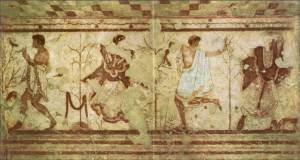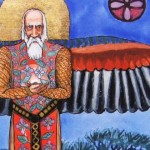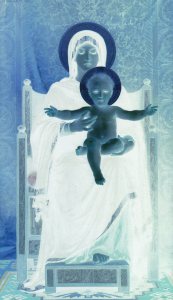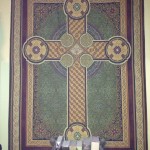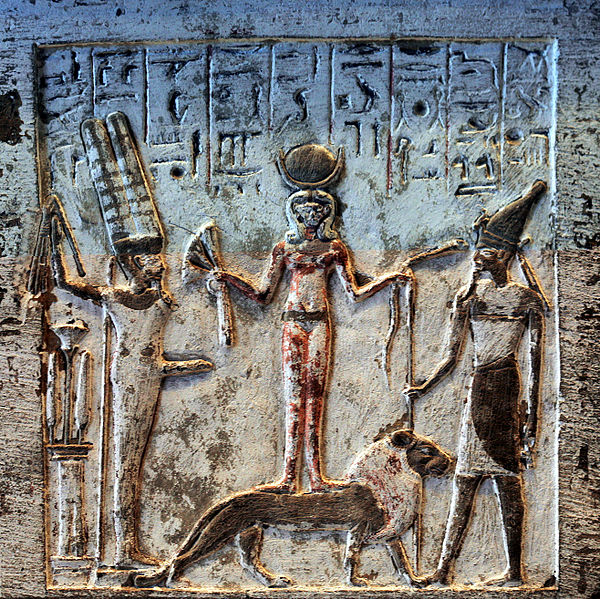I recently picked up D.H. Lawrence’s Sons and Lovers. I’ve been wanting to read Lawrence ever since I read Ronald Hutton’s Drawing Down the Moon, in which he groups Lawrence with such proto-Pagans as Robert Graves, W. B. Yeats, Ernest Westlake and Harry (Dion) Byngham (of the Order or Woodcraft Chivalry), who were part of the “matrix” out of which Neo paganismwas born.
According to Hutton, Lawrence was influenced by James Frazer, Jane Ellen Harrison, and Edward Carpenter, author of Pagan and Christian Creeds and Civilization: It’s Causes and Cure (“The meaning of the old religions will come back to him. On the high-tops once more gathering he will celebrate with naked dances the glory of the human form and the great processions of the stars, or greet the bright horn of the young moon …”).
Lawrence’s novels are interspersed with imagery of women and nature that are definitely proto-Pagan. His essay, “Pan in America” (1924), is one of the clearest examples of Lawrence’s pagan inclinations. describing what he calls the “Pan relationship” as the living relationship between man and nature. Then, shortly before his death, in his short story “The Man Who Died” (1929), Lawrence tells the story of the resurrected Christ, waking from his tomb and traveling to a temple of Isis where he serves (sexually) as the incarnated Osiris for the priestess. In his posthumous Apocalypse, Lawrence rewrites the book of Revelation as a pagan mystery text, the Whore of Babylon becoming the Great Mother, for example.
Finally, in his travelogue, Etruscan Places, Lawrence gives this imaginative interpretation of the frescoes he saw in Italy:
It is as if the current of some strong different life swept through them, different from our shallow current to-day; as if they drew their vitality from different depths that we are denied. …
Behind all the Etruscan liveliness was a religion of life … Behind all the dancing was a vision, and even a science of life, a conception of the universe and man’s place in the universe which made men live to the depth of their capacity.
To the Etruscan all was alive; the whose universe lived; and the business of man was himself to live amid it all. He had to draw life into himself, out of the wandering huge vitalities of the world. He had to draw life into himself, out of the wandering huge vitalities of the world. The cosmos was alive, like a vast creature. The whole thing breathed and stirred. …
The Whole thing was alive, and had a great soul, or anima; and in spite of one great soul, there were myriad roving, lesser souls; every man, every creature every tree and lake and mountain and stream was animate, had its own peculiar consciousness. And has it to-day.
The cosmos was one, and its anima was one; but it was made up of creatures. And the greatest creature was the earth, with its soul of inner fire. … But in juxtaposition to earth lay the sea, the waters that moved and pondered and held a deep soul of their own. …
The universe … became a dual creature with two souls, fiery and watery, for ever mingling and rushing apart, and held by the great aliveness of the universe in an ultimate equilibrium. … And everything was dual, or contained its own duality, forever mingling and rushing apart.
Lawrence’s thought is, at once, pantheistic, animistic, and vitalistic. He recognizes the oneness and the multiplicity in things, as well as the function of a creative duality.
Having read the foregoing, I was excited to read Sons and Lovers, but so far I have been disappointed. I am thinking about laying it down and instead starting Women in Love, his most popular novel, or The Plumed Serpent, about the revival of a pagan cult in Mexico. In any case, I did some internet research and found that, in addition to the sources cited above, Lawrence’s proto-paganism is best represented by a handful of statements in many different essays, poems, and letters.
One of the most interesting to me was the following, which Lawrence wrote as a kind of response to Benjamin Franklin’s own personal creed, found in Lawrence’s Studies is Classic American Literature:
Here’s my creed, against Benjamin’s. This is what I believe:
‘That I am I.’
‘That my soul is a dark forest.’
‘That my known self will never be more than a little clearing in the forest.’
‘That gods, strange gods, come forth from the forest into the clearing of my known self, and then go back.’
‘ That I must have the courage to let them come and go.’
‘That I will never let mankind put anything over me, but that I will try always to recognize and submit to the gods in me and the gods in other men and women.’
There is my creed. He who runs may read. He who prefers to crawl, or to go by gasoline, can call it rot.
Then for a ‘list’. It is rather fun to play at Benjamin.
1. Temperance
Eat and carouse with Bacchus, or munch dry bread with Jesus, but don’t sit down without one of the gods.
2. Silence
Be still when you have nothing to say; when genuine passion moves you, say what you’ve got to say, and say it hot.
3. Order
Know that you are responsible to the gods inside you and to the men in whom the gods are manifest. Recognize your superiors and your inferiors, according to the gods. This is the root of all order.
4. Resolution
Resolve to abide by your own deepest promptings, and to sacrifice the smaller thing to the greater. Kill when you must, and be killed the same: the “must” coming from the gods inside you, or from the men in whom you recognize the Holy Ghost.
5. Frugality
Demand nothing; accept what you see fit. Don’t waste your pride or squander your emotion.
6. Industry
Lose no time with ideals; serve the Holy Ghost; never serve mankind.
7. Sincerity
To be sincere is to remember that I am I, and that the other man is not me.
8. Justice
The only justice is to follow the sincere intuition of the soul, angry or gentle. Anger is just, and pity is just, but judgement is never just.
9. Moderation
Beware of absolutes. There are many gods.
10. Cleanliness
Don’t be too clean. It impoverishes the blood.
11. Tranquility
The soul has many motions, many gods come and go. Try and find your deepest issue, in every confusion, and abide by that. Obey the man in whom you recognize the Holy Ghost; command when your honour comes to command.
12. Chastity
Never ‘use’ venery at all. Follow your passional impulse, if it be answered in the other being; but never have any motive in mind, neither offspring nor health nor even pleasure, nor even service. Only know that ‘venery’ is of the great gods. An offering-up of yourself to the very great gods, the dark ones, and nothing else.
13. Humility
See all men and women according to the Holy Ghost that is within them. Never yield before the barren.
There’s my list. I have been trying dimly to realize it for a long time, and only America and old Benjamin have at last goaded me into trying to formulate it.
Lawrence’s understanding of the soul is almost Jungian. (Jung was a contemporary of Lawrence.) The idea that our souls are vaster than our conscious minds and that our soul is inhabited by “gods”, “gods” who must be respected — this is how I understand Jung.
This gem is “buried” in an essay on Benjamin Franklin of all subjects. This seems to be typical of Lawrence. His proto-Pagan philosophy is scattered throughout his writings, much of it published posthumously or in personal correspondence. I’m going to follow this with another post about Lawrence, in which I will try to collect many of his quotes of Pagan interest into some kind of organization. To be continued …

